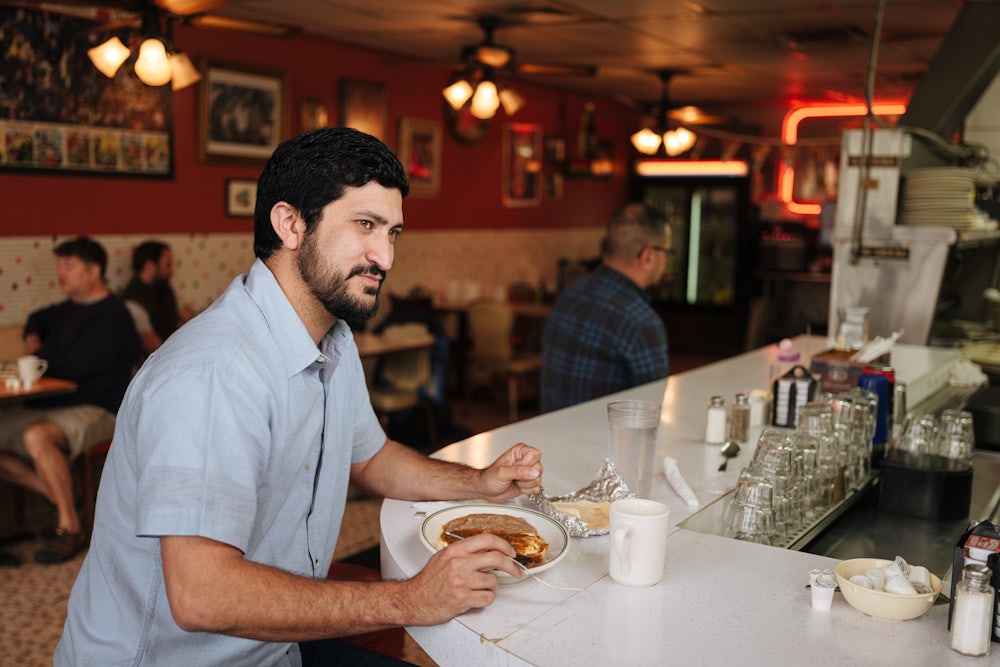On a warm February evening in Austin, just beyond the eastward march of trendy breweries, the parking lot outside Plumbers & Pipefitters Local Union 286 was packed. Inside, a couple of dozen union reps for carpenters, painters, teachers, medics, ironworkers, letter carriers, and other labor groups had gathered chairs around to listen to freshman Democratic U.S. Representative Greg Casar. Welcomed into “the Squad” as a spirited new organizer, Casar is already whip of the 102-member Congressional Progressive Caucus, despite having just arrived in Washington in December. Watching him in the center of the circle of attendees, it was easy to see why: The 34-year-old Austinite seemed approachable, energetic, and undaunted.
But back home, a Texas Democrat hasn’t won statewide office since 1994, when Casar was still a youngster, and that’s unlikely to change soon. The union hall where he spoke was in the deep blue district that overwhelmingly elected him, a large strip that runs along the I-35 corridor between San Antonio and Austin. The tension between the wider state’s conservative sentiments and more liberal-minded local politics surfaced at the labor roundtable: Someone brought up how the governor-appointed board for the University of Texas system had halted new policies promoting diversity. The move came after Governor Greg Abbott’s office called such policies illegal, part of a broader attack by state Republican lawmakers on anti-discrimination efforts. It prompted Casar to ponder a familiar question: How do you keep mobilizing people in a state when it can feel as if there’s no realistic path forward?
“They want to grind people down, to feel like it’s not even worth putting up a fight,” he told the union members, referring to how the governor and other state officials try to preempt action on the local level. But he exhorted attendees to think beyond stopping the bad stuff. “What are some things that we can go and win that prove to people that organizing can work?”
For Texas Democrats, it can invite disbelief to talk about winning, what with Republican majorities in both legislative bodies and the state itself in seeming social disarray: almost no abortion access, including in cases of rape and incest; gun violence, including the Uvalde shooting that left 19 children and two teachers dead; unaffordable housing; increased voting restrictions; and book bans—plus a failing electric grid and lawmakers trying to punish financial firms for divesting from fossil fuels.
Nearly as problematic for Democrats has been their lack of statewide prospects: In 2018, their brightest star, former El Paso Representative Beto O’Rourke, came less than 3 points from unseating Senator Ted Cruz, resulting in a wave of Could Texas Turn Blue? hype. But last year incumbent Abbott buried O’Rourke in the gubernatorial race by some 11 points. Even Republican Attorney General Ken Paxton, under indictment for securities fraud, cruised to reelection.
Democrats did manage to fend off a much-publicized effort by the GOP to win over Latino voters in 2022: Republicans, despite their advances, lost two out of three targeted districts in South Texas. But the state Democratic Party needs an overhaul, with better infrastructure and more investment from national donors, said Nick Rathod, who managed O’Rourke’s gubernatorial campaign, so “someone like a Greg Casar can come in and actually have a fighting shot at winning statewide.” Still, Rathod added, “I think the sky’s the limit for Greg.”
Casar is used to navigating the political terrain in a state where Republicans are inclined to portray even moderate Democrats as too far left. As an Austin City Council member, he fought for high-profile and contentious reforms on policing and homelessness; he also faced some intense pushback to those reforms. Political experts say there’s no current path for him statewide. But in his new role, Casar views that challenge from a different perspective: Rather than trying to adapt his views to the average voter, he wants to find places where he can bring more Texans onboard. He presents a model for how a progressive might organize outside of entrenched conservative leadership.
“When I was a City Council member, so much of my job was to defend my constituents from the worst attacks from the legislature,” Casar told me of his majority-Hispanic council district in north-central Austin. “I could do that while being myself no matter what.” The morning of the union event, we sat at a coffee shop downtown two blocks from Google’s shiny Austin office, where a couple of days earlier Casar had marched in solidarity with striking YouTube Music contractors. That was Casar being himself. So was the time he was arrested with over a dozen other protesters occupying part of Abbott’s office over an anti-sanctuary cities bill. And so was his March onstage appearance (in a Working Family Parties t-shirt) at the campus dive bar Hole in the Wall in support of bands protesting low pay at SXSW, Austin’s music festival-turned-tech bro Lollapalooza.
As we spoke, Casar contemplated how to hold on to what got him elected, while also trying to “persuade and move more voters across the state.” But his broader theme envisioned Democrats reclaiming their history of populist organizing in Texas—albeit this time in a more inclusive fashion. “I’m not worried about selling out, because I’m not going to do that,” he said, sounding cheerful. His tone turned more measured. “I do recognize [that] I have a bigger responsibility to a greater number of people—not just in my district.”
Casar grew up in Bellaire, a wealthy town within Houston, in a Mexican-Roman Catholic household he doesn’t recall as particularly political. He studied political science at the University of Virginia, where he read Gogol with residents at a juvenile correctional center, and as a student came to Austin to organize with the Workers Defense Project, which advocates for immigrant construction laborers in Texas. By 2012, still with that organization, he successfully helped push City Council to pass a “water break law” requiring employers to give construction workers 10-minute breaks every four hours.
Casar said he never expected to be a City Council member, but in hindsight, his run seems a natural extension of his organizing. In 2014, following a lively race against a 9/11 conspiracy theorist initially endorsed by the city’s largest newspaper, Casar was elected to his first four-year term. Like other rapidly growing cities, Austin faced mushrooming inequality and a skyrocketing cost of living—and then came the pandemic. Casar described his role as a sort of emergency responder, where he was focused on preventing constituents from being evicted or deported or dying of Covid-19. He advocated for the city’s eviction moratorium, and evictions plummeted during the pandemic. Casar “never runs away from a fight,” said Ken Zarifis, president of Education Austin, a union for employees of the Austin Independent School District. At the roundtable, I’d asked him how Casar’s progressive record might impact a run for higher office. “He understands what he’s doing, and he knows when he needs to negotiate,” Zarifis noted.
It’s a wisdom gained from experience. As council member, Casar worked with progressive activists to decriminalize public camping in 2019, a step he acknowledges couldn’t supplant the need for more resources to combat the city’s homelessness crisis. In 2020, he pushed to cut and redistribute police funding more following national protests over the murder of George Floyd and the police killing of Mike Ramos, an unarmed man in Austin. In both cases, Casar became a lightning rod for statewide Republicans and drew criticism from some locals. Cleo Petricek, co-founder of Save Austin Now, or SAN, a Republican-allied, pro-police PAC that pushed to reinstate the camping ban, argued that “the [Democratic Socialists of America] has infiltrated local politics,” and that Casar backed ideas that many Democrats don’t support. In 2021, Austinites voted overwhelmingly to reinstate the camping ban. And after the state legislature approved measures to discourage urban counties and cities from slashing police funding, the City Council approved a record high police budget. Later in 2021, Austinites soundly rejected a SAN proposition to expand police hiring.
Casar seems to view those experiences in part as a lesson in persuasion—how not to allow fearmongering to overtake the discourse around complex issues. When Casar ran for Congress last year, his opponents hammered him over homelessness and policing. (A mailer for one of his Democratic primary rivals, Eddie Rodriguez, featured Casar’s face and a tent on a sidewalk.) “I think the vast majority of the city wants to see positive solutions,” Casar told me. “If you’d gone and looked at my Twitter mentions, you’d think I’d lose the election four to one.” Instead, he overwhelmingly prevailed in his primary and won the general election by over 45 points.
To be clear, Casar’s congressional district, which was vacated after longtime Democratic Representative Lloyd Doggett ran in a newly created district in west Austin, does not reflect voting patterns across the state of Texas. Even among Texas Democrats, the “move in a more liberal direction collectively is much more recent, and less thorough,” said James Henson, the director of the Texas Politics Project at the University of Texas at Austin. TPP’s data suggests significantly more self-identified moderates remain in the state’s Democratic Party than in the Republican one. “The only way that Casar can really change things in Texas is via federal policy,” said Mark P. Jones, a political science professor at Rice University. “His positions are sufficiently to the left that he could never hope to, at least during the next decade, run for state office and win.”
And in the meantime, Casar has more freedom to be himself.
In January, Casar co-organized a bicameral letter to President Joe Biden signed by over 75 congressional members that, among other points, criticized the administration for planning to effectively expand Title 42 (a Trump-era policy blocking migrants from seeking asylum at the U.S.-Mexico border), which was set to expire in May. In February, the White House proposed a new rule under which asylum-seekers would have to follow requirements such as asking for protection in a “third country” before arriving at the border, or face automatic deportation. “It fails on our humanitarian values, and then I think it also will unfortunately fail on the politics,” Casar told me. Immigration policies intimately affect vulnerable people in Texas, but the issue doesn’t help Democrats in the state. “On this issue, I think Republicans have a simpler message,” which is “control the border,” said Cal Jillson, a political science professor at Southern Methodist University. “Democrats have a much more complicated message, because they’re a more complicated party.”
Casar embraces that challenge. “It’s hard to wrangle with a global humanitarian crisis,” he said. “There are no shortcuts when the task is hard.” His point evoked the lessons he had perhaps internalized in Austin about not playing on his critics’ terms. But he was also clearly playing the long game at a time when Democrats on the national level might find it easier, in the short term, to simply forsake the country’s second-largest state.
“No, I don’t have plans for me,” he said, when I asked about the prospect of statewide office. “I do have plans to be a part of doing whatever it takes to take the state back.” An employee of the coffee shop suddenly appeared. “You’re Greg Casar, right?” The employee kept it cool: “I just wanted to say thank you for all that you do.” And although Casar had a congressional caucus retreat to help plan, union leaders to visit, and a science fair to attend, he paused to chat as if he wasn’t in any rush. Texas wasn’t going anywhere.




